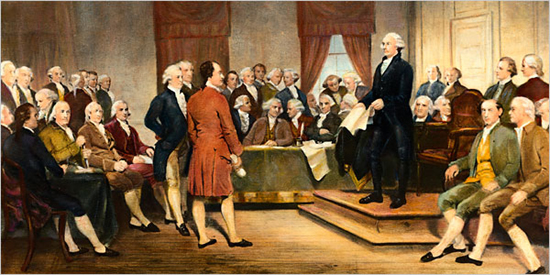
Just like us, people throughout the course of history have changed their minds and evolved. What is said today, may contradict what is said tomorrow. If you were to quote Abraham Lincoln’s views on slavery early in the Civil War, and then quoted him on the same subject after, you would get two completely different perspectives. Same with the Founding Fathers, their memoirs, letters and publications are full of contradictions and hypocrisy. Quoting complex individuals like a John Adams or Thomas Jefferson in isolation can be dicey at times. These were brilliant men who lived in an "Age of Enlightenment" and penned thousands of papers. They were also constantly re-evaluating the world around them.
Our current debate deals specifically with the establishment of the country’s foundation and what did the Founders believe at that time. Richard contends that the Founders established a Christian nation, while I believe the concept of a 'Christian nation' goes against the very essence of what they were trying to accomplish. Here are two examples of quotes that Richard offered and my counter-quotes. I have added the source information for reference:
Thomas Jefferson:
Richard’s: “The practice of morality being necessary for the well being of society, He [God] has taken care to impress its precepts so indelibly on our hearts that they shall not be effaced by the subtleties of our brain. We all agree in the obligation of the moral principles of Jesus and nowhere will they be found delivered in greater purity than in His discourses.” – Thomas Jefferson to James Fishback (1809)
Mine: “Because religious belief, or non-belief, is such an important part of every person's life, freedom of religion affects every individual. Religious institutions that use government power in support of themselves and force their views on persons of other faiths, or of no faith, undermine all our civil rights. Moreover, state support of an established religion tends to make the clergy unresponsive to their own people, and leads to corruption within religion itself. Erecting the ‘wall of separation between church and state,’ therefore, is absolutely essential in a free society.” – Thomas Jefferson to Virginia Baptists (1808)
John Adams:
Richard’s: “The general principles on which the fathers achieved independence were the general principles of Christianity. I will avow that I then believed, and now believe, that those general principles of Christianity are as eternal and immutable as the existence and attributes of God.” – John Adams to Thomas Jefferson (1813)
Mine: “The United States of America have exhibited, perhaps, the first example of governments erected on the simple principles of nature; and if men are now sufficiently enlightened to disabuse themselves of artifice, imposture, hypocrisy, and superstition, they will consider this event as an era in their history. …It will never be pretended that any persons employed in that service had interviews with the gods, or were in any degree under the influence of Heaven, more than those at work upon ships or houses, or laboring in merchandise or agriculture; it will forever be acknowledged that these governments were contrived merely by the use of reason and the senses.” – John Adams, A Defence of the Constitutions of Government of the United States of America (1787-88)
So were they for or against establishing America as a Christian-Nation? In this case both quotes contradict one another. One could dispute the time context, in which case the older quotes (mine) would be accurate as they are closer back to the country’s founding. However, you could counter-argue that both men grew to embrace the concept in which case the newer quotes (Richard’s) are plausible. My point is that you can quote and counter-quote people again-and-again and still not know what they were truly thinking. One quick search on the Internet reveals hundreds of pages of historical quotes, which have been isolated and manipulated to support all kinds of agendas. Christians, atheists, conservatives and liberals all have websites that reprint the Founding Father’s words for and/or against their cause.
So who is right and who is wrong? I think the answer is – it depends…
Updated: Thursday, 10 March 2011 3:58 PM EST
Permalink | Share This Post





